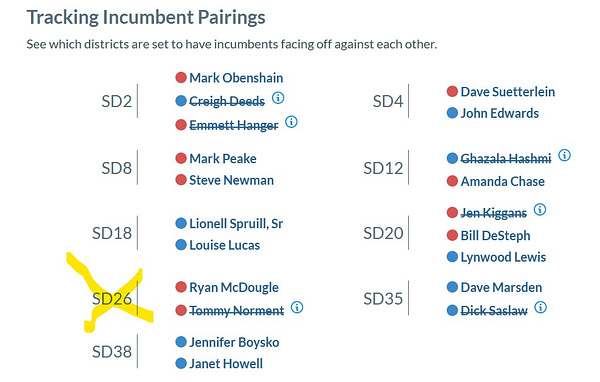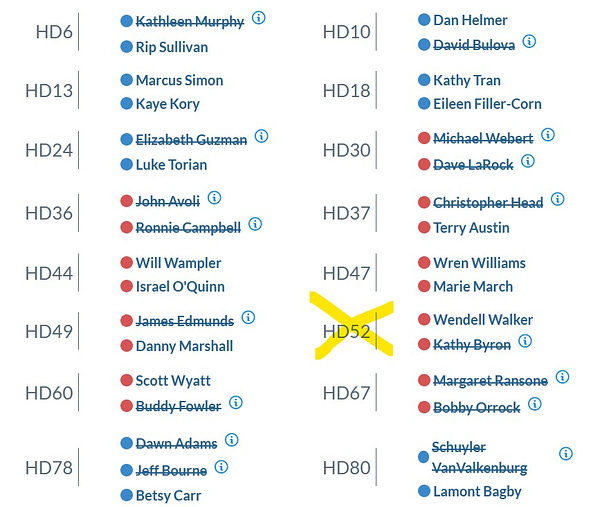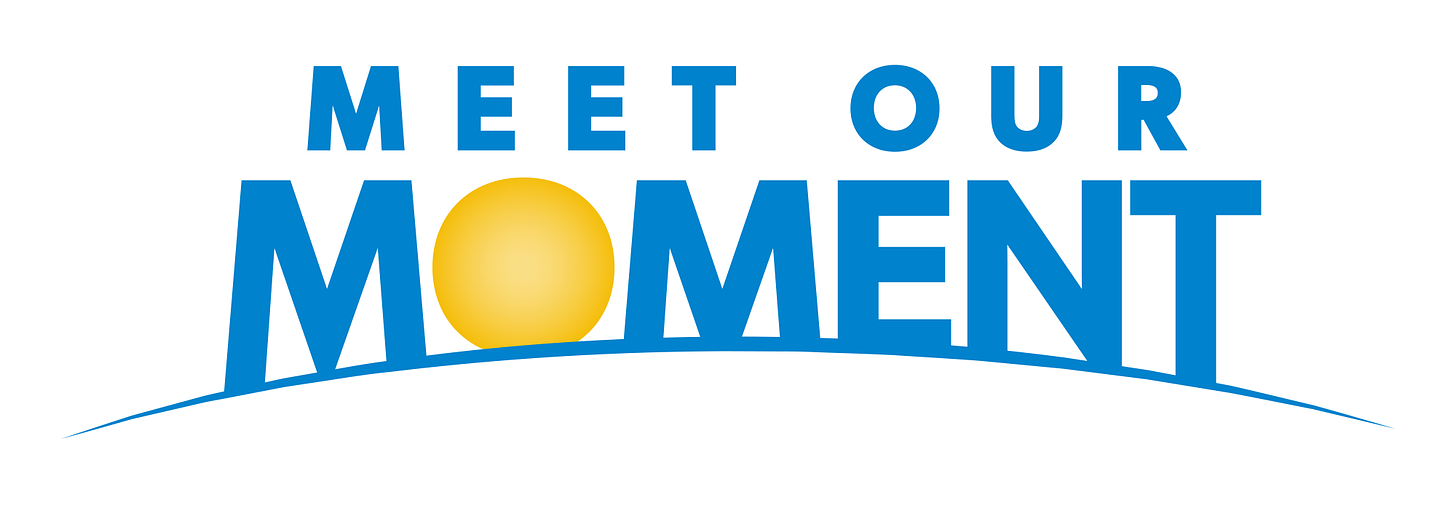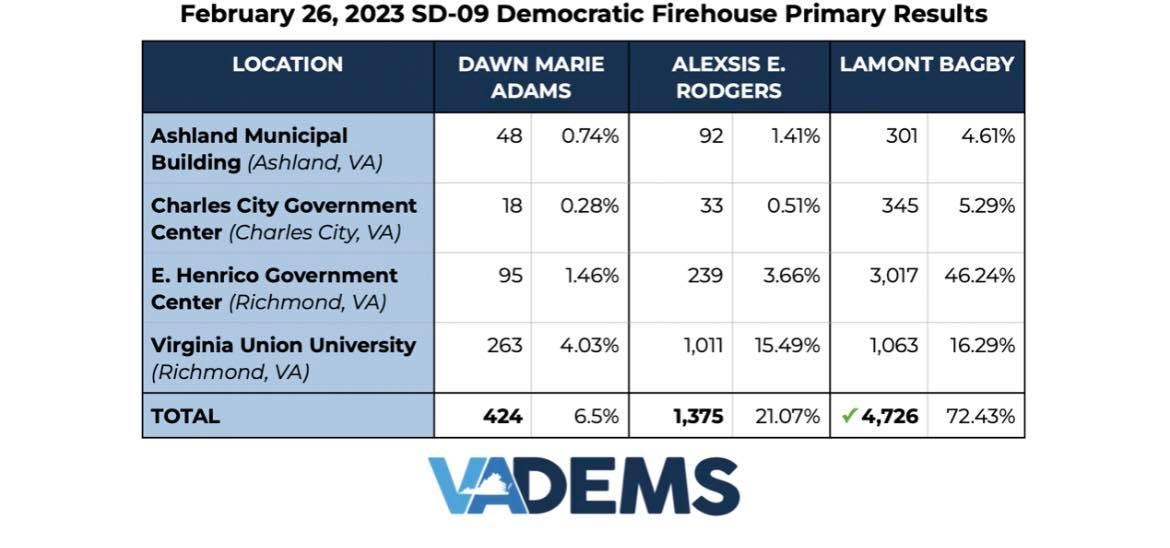More oversight is coming to Virginia power companies
The General Assembly passed the Affordable Energy Act giving the SCC oversight power
This is a daily newsletter covering Virginia politics from top to bottom. Please consider becoming the ultimate political insider by supporting non-partisan, independent news and becoming a paid subscriber to this newsletter today.
Have a tip? You can reply to this email, or email me directly at Brandon@virginiascope.com
Today’s Sponsor: Meet Our Moment
Meet Our Moment is an effort spearheaded by former Delegate Jay Jones to recruit and train minority and female Democratic candidates to run for and win state and local offices across the Commonwealth. To date, Meet Our Moment has trained 34 Virginians from every region of Virginia, 18 alumni are active candidates in 2023, and our candidates are winning. The program is entirely free to participants.
Apply for our March 25th training session in Norfolk, our last before the 2023 Virginia legislative elections, by visiting meetourmoment.com/apply. Applications will be accepted through February 28th.
The Affordable Energy Act
The General Assembly passed the Affordable Energy Act this year providing more oversight on power companies in the hopes of lowering electricity bills for Virginians. The bill passed in both chambers unanimously - a feat that anyone following Virginia politics in recent years likely did not expect.
The Southern Environment Law Center praised the bill. “This is a major victory for Virginians. For the first time in a generation, the Commission will have the power to make sure all customers pay a fair price for electricity,” SELC said in a statement. “This is essential as we continue Virginia’s clean energy transition and ensure that inflated prices are not passed on to Virginians who can afford them the least.”
A source from the Gov. Glenn Youngkin’s office who was close to negotiations on this legislation says that he and his team spent weekends and late nights working on getting this legislation done. The source says the governor’s team undertook scenario planning with legislators and the attorney general’s team while working through regulatory processes and timelines.
The source also says that the governor and his team worked through the details to bring together consumers, key stakeholders, industry leaders, and environmental groups.
Senate Democrats are not eager to give the governor much credit for this bill, however.
“He is responsible for mucking it up until the 11th hour,” tweeted state Sen. Mamie Locke (D) on Sunday. “His inability to understand the legislative process boggles the mind.”
But the founder of Clean Virginia, a group that gives millions to Democratic candidates in Virginia each year, also praised the governor’s office for this work.
“The passage of the Affordable Energy Act and the Governor’s leadership on rate reform legislation represents a watershed moment for Virginia,” said Michael Bills, Clean Virginia’s board chair and founder. “For the first time, a bipartisan coalition of legislators and the Governor have successfully stood up against the legalized corruption of our monopoly utilities, putting an end to decades of profiteering at the expense of Virginia families and businesses.”
Del. Sally Hudson (D) was a chief co-patron on the bill in the House and says it will take some times before Virginians see results from this legislation on their power bill. “It’ll take some time for the bill to really hit people’s pocketbooks, because electric rates only get set every three years,” Hudson said in a recent interview with NBC 29. “So, the next time that the state will set Dominions electric rates is 2024. That means we have to wait a little while to see the benefits, but the impact of this bill will last.”
Update: A change made on the last day of session pushed the date back a year to 2025, instead of 2024.
More reporting from Center Square: “The finished version of the bill that was agreed to by the General Assembly Saturday will set Dominion's profit margin at 9.7% until 2025, at which time the SCC will have the authority and discretion to set the profit margin.”
Update: Alexsis Rodgers Congratulates Del. Bagby on Winning Democratic Firehouse Primary
“Congratulations to Del. Bagby on winning the Democratic nomination for Senate District 9,” Rodgers said in a statement Monday morning. “Thank you to all of the volunteers who came together to run the firehouse primary. I personally understand what it takes to coordinate this type of election, so I am grateful for those in the party who are committed to our democratic processes.
“Lastly, thank you to everyone who voted for me and support my campaign. It was no easy feat to run a four-day campaign, but we rolled out one of the best grassroots efforts to earn every single vote.
“I have always fought for working families and reproductive rights and will continue to build on the legacy of Congresswoman-elect Jennifer McClellan to improve the quality of life for everyone across the commonwealth.”
The Democratic Party of Virginia released the full results of the SD-09 firehouse primary
More Retirements:




More Links
Norment, long among the most powerful in the Capitol, is retiring
Youngkin says Biden should go to Ohio instead of Virginia to talk healthcare
Attacks on public transit drivers could become crimes after new bill passes Virginia House
Gov. Youngkin praises bipartisan passage of workforce legislation
Brewery self-distribution bill passes through GA, awaits Youngkin’s signature
Virginia K-12 enrollment, teacher vacancies increase; home school numbers dip
By Zahra Ndirangu, Capital News Service
RICHMOND, Va. — Virginia students are returning to K-12 public schools — although enrollment has not returned to pre-pandemic levels — but there are fewer teachers due to an increase in teacher vacancies.
The rebound comes after an enrollment decline the previous two years.
FALL MEMBERSHIP DATA
Enrollment numbers increased by more than 11,300 students from fall 2021 to fall 2022, according to data from the Virginia Department of Education.
VDOE annually collects statistics on the number of students enrolled in public school on Sept. 30. This report, known as “Fall Membership,” is submitted by each school in Virginia that officially enrolls students.
Virginia K-12 enrollment sits just over 1.26 million full and part-time students combined. Part-time students are nonpublic school students who take one or more classes in a public school, according to VDOE.
The numbers show schools haven't reached the 2019-20, pre-pandemic levels of almost 1.3 million students.
The number of current part-time students decreased by over 100 students since the last school year. There was a significant increase of over 500 part-time students in the 2020-21 school year, while numbers fluctuated in prior years with no apparent trend.
The number of home-schooled students, including religious exemptions, decreased for the current school year, down 8% at almost 57,000 students. The previous two school years saw a spike in total home-schooled students, reaching over 65,500 home-schooled students in the 2020-21 school year.
The category with the most home-schooled and religious exempt students is K-5, accounting for almost half of the total.
TEACHER VACANCIES
There was a 25% increase in teacher vacancies throughout Virginia from the 2021 fall report to the 2022 fall VDOE report. The number of vacancies increased from just over 2,800 to over 3,500, according to the data, which does not include personnel or transportation positions. The numbers may have changed, as they pertain to a snapshot of data from fall 2022, because school divisions do not report daily, weekly or monthly data on unfilled positions, according to the VDOE.
There was a 12% increase in teachers leaving the workforce in the 2021-22 school year, when compared to the pre-pandemic yearly average, according to a Nov. 2022 report published by the Joint Legislative Audit and Review Commission, or JLARC. At the same time, there was a 15% decrease in newly licensed teachers, according to JLARC.
As more teachers leave the profession, fewer teachers are being licensed, according to the JLARC report. Nearly all divisions surveyed for the report indicated that finding “fully qualified applicants” was among their biggest challenges when it came to staffing.
The Richmond Education Association and other organizations have lobbied for better education funding and met with state lawmakers to provide support for educators, according to REA president Katina Harris.
There are a few changes that will help increase enrollment, according to Harris, and lawmakers need to commit necessary funding. Students will receive a better education with smaller classroom sizes, more available counselors and more teacher support for remedial learning programs, Harris said.
“At minimum, $1.3 billion is needed to fully fund our [Richmond City] schools right now,” Harris said. “That shouldn’t be that hard to ask because the children are literally the future.”
Richmond City allotted just over $200 million in general funds for education in the 2023 fiscal year, according to the city’s budget. The city has also budgeted $200 million in capital improvement funds for school modernization and improvement for the upcoming 2024 fiscal year.
HOME-SCHOOLER APPEAL
The pandemic contributed to the increase of home-schooled students, according to Yvonne Bunn, the director of homeschool support and government affairs for the Home Educators Association of Virginia.
There was an almost 56% increase in total home-schooled students in the 2020-21 school year. The amount of K-5 home-schooled students doubled that year.
Many parents have chosen to continue home schooling even since schools reopened. Parents can tailor their children's education to their needs, according to Bunn.
The home environment is safer for children who deal with bullying or harassment in public schools, Bunn said.
“It takes them out of that where they can be in their home, they can be more secure in their home,” Bunn said.
Home schooling in Virginia allows parents to meet their children where they are, rather than children struggling to keep up in schools, according to Bunn.
“If they got average or below average, we'd go back over it to see how they could understand the material better,” Bunn said. “So that's the key to home schooling, one-on-one tutoring, that's really the key.”
Virginia Commonwealth University student Celia Donnelly is a senior studying graphic design. Home schooling allowed her time to pursue her interests, which eventually led to her current studies, she said. Donnelly was home-schooled from K-12 in North Carolina, she said.
Parents can provide resources, such as curriculums that adapt to specific learning styles, that are not readily available in public school, or are not as standardized, according to Donnelly.
“It’s all standardized, you have a lot of people who need a lot of things, so just inherently there’s going to be a lot of gaps … and home schooling can help with that,” she said.
Donnelly’s mother valued and through home-school taught her the ability to “question everything and stay curious” about the world around her, she said.
LEGISLATION AND FUNDING
Virginia lawmakers allotted $3.2 billion in direct aid for state education in the 2022-24 biennium budget. The budget also included reforms for a 10% teacher pay raise split over two years. Funds from the American Rescue Plan act directed $125 million to fund a one-time, $1,000 bonus to educators last December.
Lawmakers have introduced proposals during the current General Assembly session to tackle the deficit of teachers, as well as the increasing number of home-schooled students.
Del. Sam Rasoul, D-Roanoke, introduced House Bill 1566, which would require the state to pay educators a rate equal to or above the national average salary for teachers. The bill reported from a House committee but did not advance from the Appropriations committee.
Del. John McGuire III, R-Goochland, proposed HB 1454. The bill would have eliminated the four criteria needed for parents and guardians to home-school their children.
Virginia laws currently require that homeschooling educators must hold a high school diploma, be qualified by the Board of Education, provide children with a program that can be delivered through distance learning or provide evidence that they have an ability to provide adequate education. A House education subcommittee killed the measure.
Del. Marie March, R-Floyd, proposed HB 1475, which would prohibit schools from joining interscholastic organizations that would not allow home-schooled students. Similar versions of the bill to allow home-schooled students to play sports have been introduced for years. The bill passed an education subcommittee but was defeated in committee.
State budget amendments currently under debate by lawmakers also proposed an increase in education spending, according to a report by VPM. Additionally, House and Senate versions include a 2% salary increase that would extend to K-12 educators.







